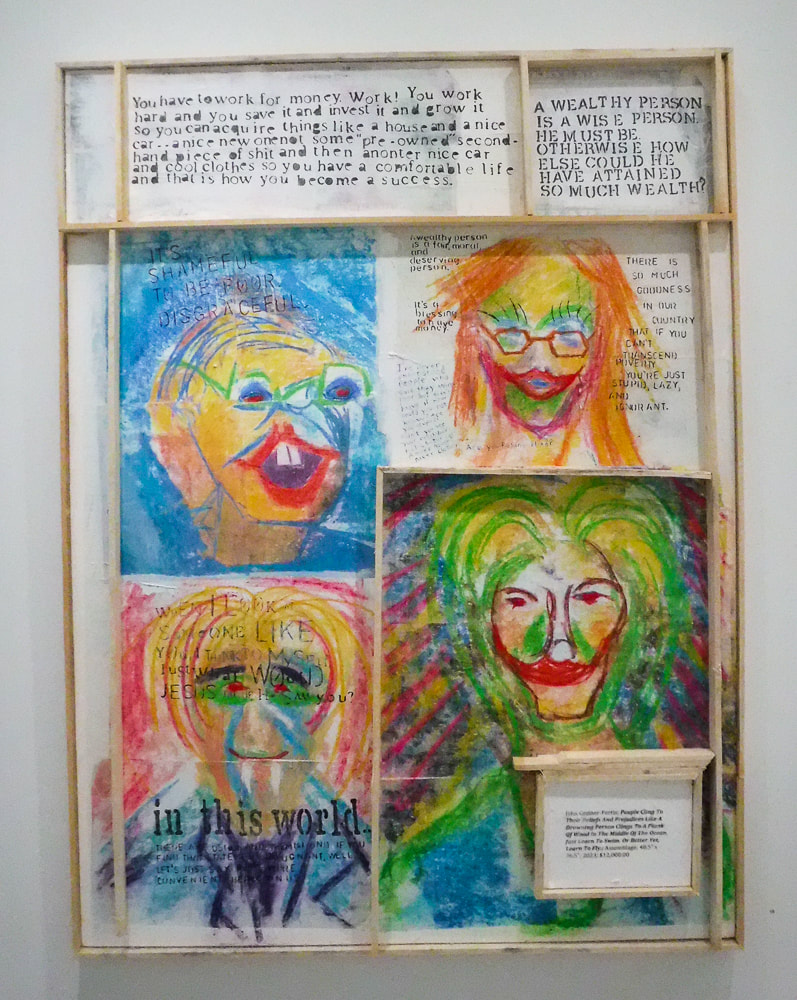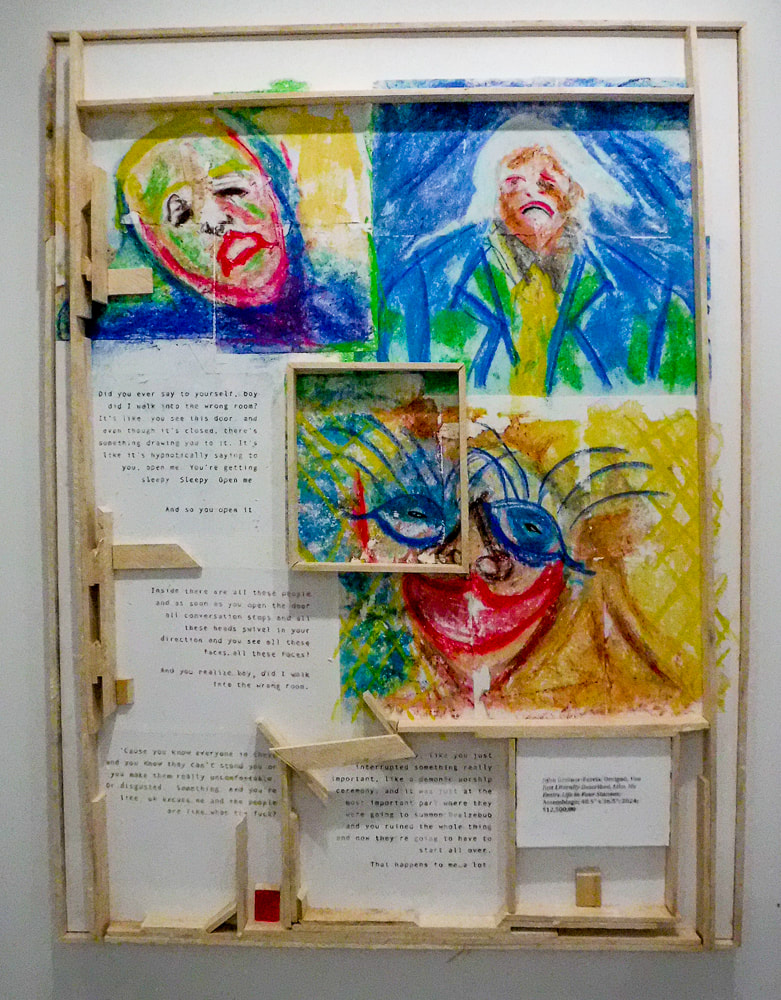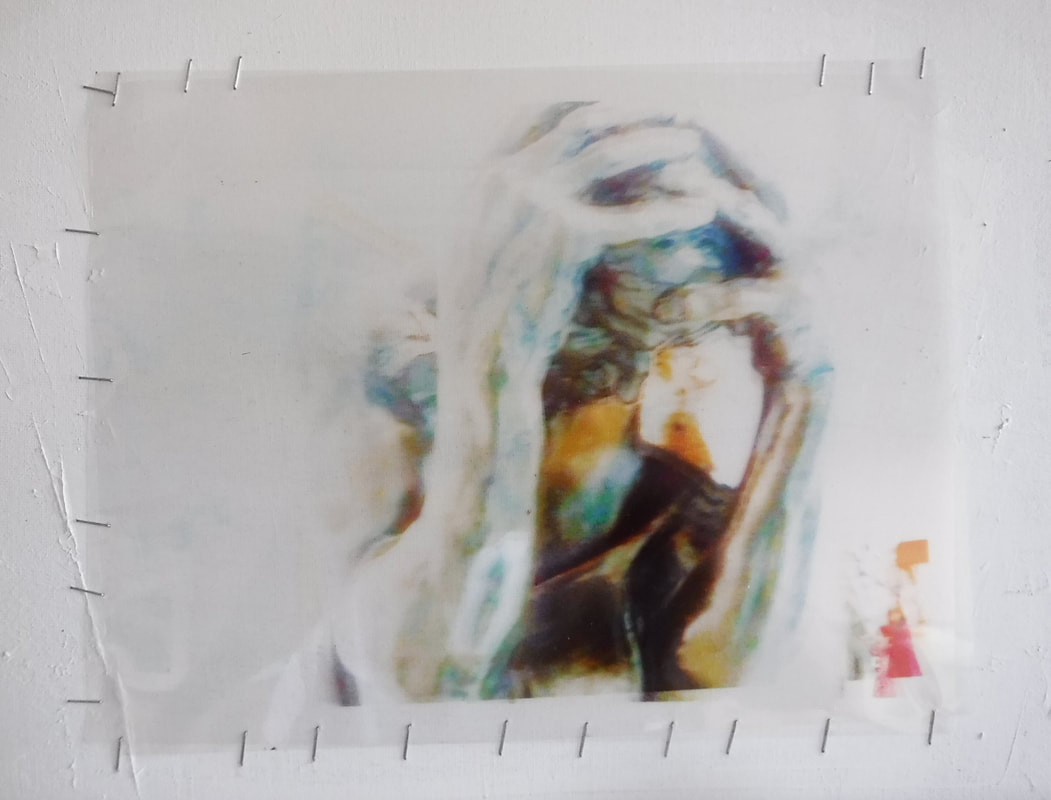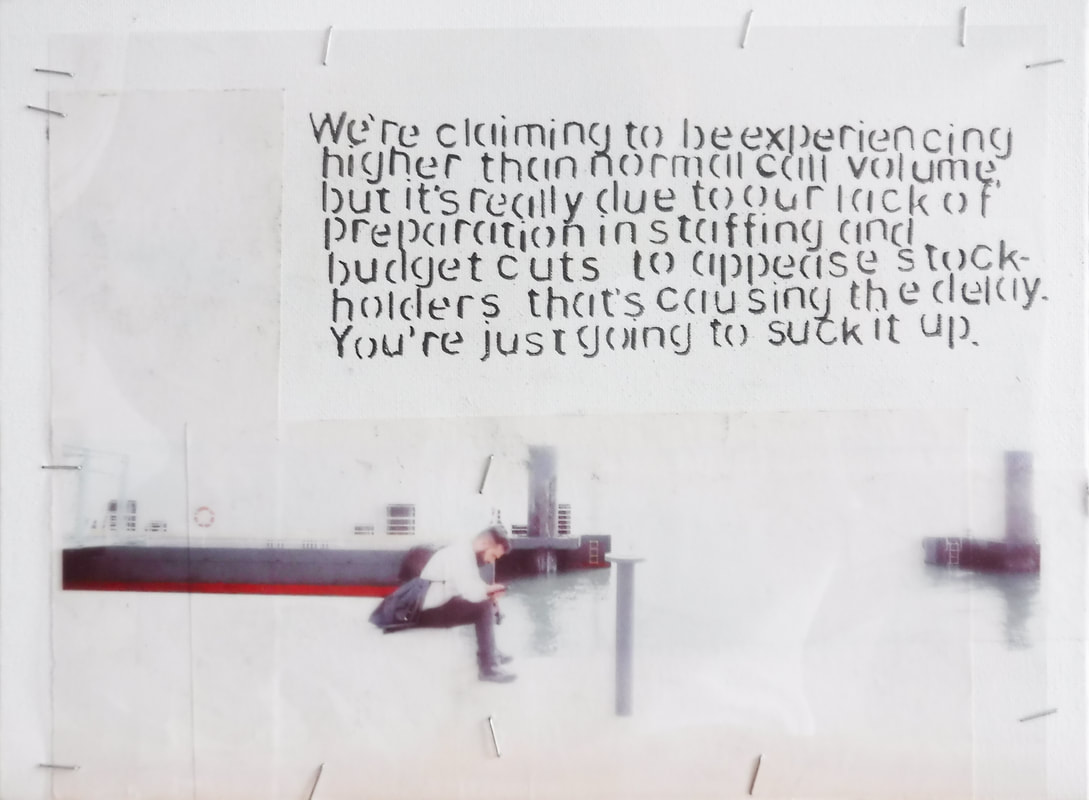|
Natural Abstracts is my first book of photographs that I made in response to the Trump years and during the beginning of the Covid pandemic. Oddly, while I was making these images I had no idea that that was what I was doing. Most times, artists are just reacting. It's the dealers and art writers who need an explanation of what an artist is doing, so usually the artist just makes it up as they go along, then back fill the explanation in hindsight. File that under #thetruthaboutart
0 Comments
The first three of what will be a series of eight...Contemporary Dialogues closed yesterday and it's back in the studio tomorrow.
Text for: My Parents Had A Baby And It Looked Like You; Assemblage; 48.5” x 36.5”; 2024; $14,000.00 You ask, where did we come from? I will tell you. We were spit out of a spiraling vortex where there was no consciousness of this reality, where cause and effect had no meaning or nothing else had meaning for that matter. Nothing was loved or cherished. Nothing was hated. Nothing was named. Nothing had value. What saved us, if that’s even the correct term, wasn’t a god. Perhaps it was a mutated gene. All we could do was live—stay alive. Breathe in and out. Pump blood through our veins. Replace nourishment to our vital organs. We learned to kill with our bare hands and we learned to like it. We focused all of our energies on devising ways to kill, and in doing so, we realized that the more life we snuffed out, the safer we felt. No other life became more important than ours. We embraced everything that was toxic and harmful. We ate shit. Breathed water. Exhaled noxious gas. Still we didn’t die. We actually grew stronger. And now here we are. Text for: People Cling To Their Beliefs And Prejudices Like A Drowning Person Clings To A Plank Of Wood In The Middle Of The Ocean. Just Learn To Swim. Or Better Yet, Learn To Fly; Assemblage; 48.5” x 36.5”; 2023; $12,000.00 You have to work for money. Work. You work hard and you save it and invest it and grow it so you can acquire things like a house and a nice car —a new one not some “pre-owned” second hand piece of shit and then another nice car and cool clothes so you have a comfortable life and that is how you become a success! A wealthy person is a wise person. He must be, otherwise, how else could he have attained so much wealth? A wealthy person is a fair, moral, and deserving person. It’s a blessing to have money. There is so much goodness in our country that if you can’t transcend poverty, you’re just stupid, lazy, and ignorant. It’s shameful to be poor. Disgraceful. When I look at someone like you, I think to myself, just what would Jesus do if He saw you? I’ve never understood people who say growing up, they were poor but they didn’t know it. How could you not know?! Are you stupid? Didn’t you see your neighbor had a better car? A nicer house? Nicer clothes? Are you fucking blind? In this world there are Us(es) and Them(s), and if you find that statement repulsive or repugnant, well…let’s just say it’s more convenient being an Us. Text for: Omigod, You Just Literally Described, Like, My Entire Life In Four Stanzas; Assemblage; 48.5” x 36.5”; 2024; $12,500.00 Did you ever say to yourself, boy did I walk into the wrong room? It’s like, you see this door, and even though it’s closed, there’s something drawing you to it. It’s like it’s hypnotically saying to you, open me. You’re getting sleepy. Sleepy. Open me. And so you open it. Inside there are all these people and as soon as you open the door all conversation stops and all these heads swivel in your direction and you see all these faces…all these faces!…and you realize, boy, did I walk into the wrong room. ‘Cause you know everyone in there and you know they can’t stand you or you make them really uncomfortable. Or disgusted. Something. And you’re like, oh excuse me and the people are like…what the fuck? Or they’re angry, like you just interrupted something really important, like a demonic worship ceremony, and it was just at the most important part where they were going to summon Beelzebub and you ruined the whole thing and now they’re going to have to start all over. That happens to me…a lot. Quicksand Baby, performed by John Greiner-Ferris at Atlantic Works Gallery in East Boston at Third Thursday, January 18, 2024.
I spend a great deal of time and energy undoing a lot of what I was taught. I almost wrote, "learned" but it wasn't that I learned it. Certain things were planted into my head--and here I'm talking about in art school--that there are specific ways to do things. It's surprising how rigid the art world can be. In photography, when I pick up a camera, I am constantly trying to undo what was drilled into my head, what a "good" or "acceptable" print or picture is. I still embrace the word, image, though, simply because it embraces anything 2-D that the eye takes in. So, yes, I can make a "good" image with a camera. I can make a "pretty" picture. And sometimes I still have to. Don't expect a mainstream magazine, for instance, to go ga-ga over your art.
Yes, these images are intentionally overexposed. I started making them a few years ago when I unintentionally made some images of Sue at the beach, and had forgotten to change to ISO setting. Instead of seeing a mistake, I went with it, and have developed a way of seeing and making images that I can then transfer to acetate. I've been doing this for a couple of years now. There is more to it than the ISO setting. There are the other settings that interact and then, the most important part, the metering. But I came to all this from a "mistake". 250 words
These assemblages are an ongoing studio project I began this year showing people who turn their backs on the noise of society, e.g. politics, social media, and cell phones, seeking solitude. They show people on beaches, alone as the individuals they are, even in a group. Our society is very group-oriented, and we are expected to conform to our groups. Through images and text, I show people, small as they are, who have carved out time and space for themselves. Prof. Arlo Kent is the main piece with smaller assemblages exploring the world more deeply. I start with collage that I’ve painted and dissected, and adhere it to canvas with wheat paste. Photographic images printed on acetate are layered and attached over the collage. The mats on the smaller pieces—windows within windows—are voyeuristic, like peering through a viewfinder. I want the viewer to experience the same feeling, preserving the feeling of aloneness I feel for the subjects. A handmade frame of ash completes each assemblage. Each piece shows the imprint of my hand. Blemishes are intentional, expected, welcomed, including uneven frames and exposed or stray pieces of collage jutting beyond the mat, especially now that we have AI. The pieces and the artist are guaranteed to be 100 percent human-made. Do you ever feel you or your work are so misunderstood that you could just spit?
And don't give me the line that it's not misunderstood, it's just bad. Bullshit. Photographers--and I use that term loosely because the photography-based world has so radically changed since the days when Ansel Adams was king--tell me I shouldn't focus so much on the materials but on the image. And I just want to scream, They just don't get it! The materials now are just as important as the image, if not more. Today, the image, or in this case, the "photograph", whatever the hell that is, has been subsumed by the artwork. The photograph is no longer sacrosanct. You can no longer print it, put it in a frame, hang it on a wall and bow down before it. It is now a commodity. Words used to be that way. When the printing press was invented, words were locked up in a safe. Now we print them out and staple them to a bulletin board: Ice Cream Social Tonight! Which is why I staple my images. Images are just as commonplace as a piece of paper. Which is why, for example, the staples in the above image (two pieces of acetate printed upon and layered, btw) are just as important to the work as the image. In this case, I'd say they were equal. If I used a violin in my work, it wouldn't mean much. But when Ai Wei Wei uses one, it has an entirely different meaning. A violin, in Wei Wei's world, could have gotten him killed. It would have pegged him as an intellectual. You have to know the meaning of objects and materials, otherwise you won't experience the richness of a piece of art. In my work, the material I use--plebeian material, I like to call it: cheap stuff--directly addresses the high cost of making art today. When I use acetate sheets, window screen, lathing, I'm saying, You don't need the multi-thousands of dollars to buy a Nikon Z series camera and lens to make an image. You don't need the money for a degree from RISD or Yale. The material is conveying as much message as the images. They're equal. They're democratic. i’m amazed by what the sea belches up just bits & pieces nothing ever whole never complete
lobster traps boat parts broken shells crab clam scallop razor lady slipper whelk the devil’s pocketbook jingle shells nothing ever whole never complete just bits & pieces they stroll the beach searching but for what they don’t know something that has meaning only to them then something catches their eye they stoop pick it up turn it over skip it back onto the waves but sometimes they pocket it bring it home puzzle pieces puzzle pieces without the box to see the big picture bits & pieces nothing ever whole never complete just their shells --Prof. Arlo Kent I do not have a high regard for humanity. We're destroying the planet through greed and neglect. We can't get along. We are a warring species. I think we should just die out, as it seems we're destined to do, and let another species take over for awhile. These images are part of an assemblage or mixed media piece I'm working on. I still haven't figured out what to call what I'm making, trying to fit it into an understandable label, and that's proving a problem as I try to "explain" my work to gallerists and other gatekeeper types. I'm amazed by what the ocean belches up on the beach. Just bits and pieces. These are not just bits and pieces of shells, they are bits and pieces of individual people on the beach. Just bits and pieces themselves, belched up by the sea. Searching, but for what?! They don't know. But there are just bits and pieces. And every so often they pocket something and bring it home. Just puzzle pieces. But they can't see the entire picture, so they'll never know. Just bits and pieces. Puzzle pieces. And that's pretty much how I feel about humanity. These images could be printed, framed, and hung on a wall, one after another. Or put in a book. But I don't see the point of that. Prof. Arlo Kent And explanation, and I suppose an apology, of sorts.
At the risk of being too on the nose, I'd like to give an explanation of my work. I know there are artists who are very much opposed to explaining their work, believing that the work should stand on its own, that if you have to explain it the work isn't successful. But I believe an artist should be able to articulate what they are doing, that it makes the artist and the viewer complicit, and that the viewer, quite frankly, needs all the help they can get from today's modern work. If you approach my work and understand from the beginning that everything I do is political, you've won three-quarters of the battle. Starting with subject matter, coyotes are not the cuddliest of animals. They're not the pretty birds and cute animals people want. They're a step above rats, in terms of animal subject matter. Even Indigenous People don't look that kindly upon them. The Hopi--and someone correct me if I'm wrong--believe that coyotes can be spirit animals, but a real coyote are few and far between. Embracing a coyote as a subject flies in the face of everything in the bougie art world. Also, the subject matter of a poor woman, probably a single mom, isn't in the same vein of the heroic woman that Hollywood like to depict. Nor do I make "pretty" art; it's not part of my sensibility. I show the marks, the splotches, the "mistakes"> Black and white. A white coyote against a white background, and a black coyote against a black background--does that really need explanation?? My work constantly addresses the lives of the ordinary individual against the greater forces in our society.
I'm changing my images intentionally. Even more painterly. I see the world fading, decaying. But that's not a bad thing at all. When I first came to Portugal I was so anxious and hurried. Now it's as I keep saying about the country: Portugal is hard, then she smiles and she reveals herself. I love this country. The pace of life, and how they live it.
Today I ordered canvases to be delivered to my studio so I can begin work when I get back to the United States. I don't want to go back, but if I have to I might as well begin work. I have so many ideas I want to try out, to execute. I want to combine the words in my head with the images I'm making here. With the work I began earlier this year. Because here, even here, the syphilitic voice of Trump can be heard. This is the only way I know how to respond to what is happening. |
Author
John Greiner-Ferris is a politically motivated, multi-disciplinary artist in the Boston area. Sometimes he makes images. Sometimes he writes. Sometimes he does both. Archives
May 2024
Categories
All
|






 RSS Feed
RSS Feed
